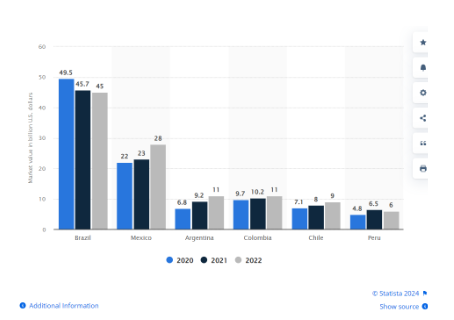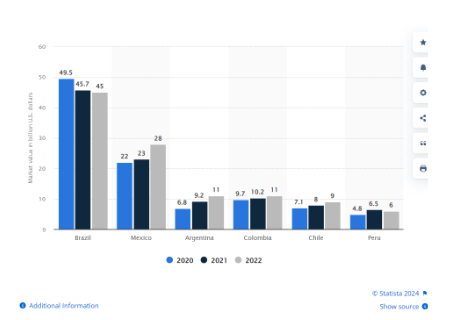Outsourcing Software Developers teams from Latin America
Table of Contents
In today’s dynamic digital landscape, businesses race to innovate. Outsourcing Software Developers teams from Latin America offers timely expertise within budgets.software development stands as the cornerstone of corporate strategy. However, amidst the ever-accelerating pace of technological change, organizations face a pressing challenge: securing the right talent and expertise within tight deadlines and budgets. In response to this dilemma, a paradigm shift is underway as businesses increasingly look beyond their borders for solutions.

While traditional outsourcing destinations in Asia have long held sway, a new contender emerges on the horizon: Latin America. The region presents a compelling opportunity for companies seeking to bolster their software development capabilities by outsourcing software development teams from Latin America. Gone are the days of grappling with time zone disparities and language barriers; Latin America offers a unique combination of affordability, a rich talent pool, and cultural synergy that make it an ideal destination for outsourcing software development teams.
In this article, we delve into the reasons why Latin America is poised to become the go-to destination for outsourcing software development. From cost competitiveness to a burgeoning pool of skilled engineers, and from shared cultural values to seamless communication, Latin America offers a comprehensive solution to the outsourcing conundrum. Join us as we explore how outsourcing software development teams from Latin America can unlock unparalleled value and propel businesses towards success in the digital age.
1. Overview of the Latin American Software Industry
Productivity software, aptly named for its ability to enhance efficiency in generating various forms of information such as documents, presentations, databases, and graphs, is a cornerstone of modern work environments. In 2023, Latin America witnessed substantial growth in its productivity software industry, with revenues reaching approximately 2.1 billion U.S. dollars, notably with 1.4 billion U.S. dollars attributed to South America alone. The prevalence of office software underscores its significance within the Latin American productivity software market, boasting features like seamless updates, robust security measures, and facilitation of collaborative work environments. This growth also reflects the region’s potential for outsourcing software developers teams from Latin America, tapping into their expertise to further innovate and expand the productivity software landscape.
In stark contrast, enterprise software serves as a strategic tool tailored to meet the diverse needs of businesses rather than individual users. The spectrum of software required by enterprises varies widely, encompassing essentials such as project management, data analysis, and communication tools, alongside bespoke software solutions. Outsourcing software developers teams from Latin America can provide a cost-effective and efficient solution for businesses seeking to fulfill their enterprise software needs.

Latin America: IT market value by country 2022 | Statista
In 2022, Brazil emerged as the Latin American leader in the information technology (IT) sector, boasting a robust market valued at 45 billion U.S. dollars. Following closely, Mexico secured the second position with a substantial IT market worth 28 billion U.S. dollars, while Peru lagged behind with a market value of only 6.5 billion U.S. dollars. Within Brazil’s dynamic IT landscape, hardware emerged as the most lucrative segment, commanding a staggering 24.7 billion U.S. dollars, while the software market held considerable value at 11.7 billion U.S. dollars.
2. Briefing of Latin America as an Outsourcing Destination
2.1. Advantages of Outsourcing to Latin America
When outsourcing software developer teams in Latin America, it is important to consider what advantages you gain through this in the first place. Thus, in considering outsourcing destinations, Latin America offers a myriad of advantages that make it an increasingly attractive option for businesses worldwide:
- Proximity and Time Zone Compatibility:
Latin America’s geographical proximity to North America fosters closer collaboration and smoother project management due to minimal time zone differences. This proximity enables real-time communication and facilitates agile development methodologies.
- Cultural Affinity and Language Proficiency:
Latin American countries often share cultural similarities and possess a high level of English proficiency, particularly in major outsourcing hubs. This cultural alignment fosters stronger rapport, minimizes communication barriers, and promotes seamless integration with clients’ teams.
- Cost-Effectiveness and Competitive Rates:
Latin America boasts a favorable cost structure compared to other outsourcing destinations, with rates typically ranging from 30% to 50% lower than those in North America. This cost-effectiveness is attributed to factors such as favorable exchange rates, lower living costs, and competitive pricing within the region’s rapidly growing IT industry.
- Skilled Software Developers and Talent Pool:
The region is home to a burgeoning talent pool of highly skilled software developers, with approximately 1 million ICT experts across Latin America. Renowned educational institutions such as Mexico’s Instituto Tecnológico y de Estudios Superiores de Monterrey and Colombia’s Universidad de los Andes churn out top-tier graduates, while the proliferation of software startups and coding boot camps further enriches the talent landscape for outsourcing software developers teams from Latin America.
2.2. Key Countries in Latin America for Software Development Outsourcing
Several Latin American countries have emerged as prominent destinations for software development outsourcing, each offering unique advantages and capabilities:
- Mexico:
Mexico stands out as a leading outsourcing destination, boasting a robust IT infrastructure, a large pool of skilled professionals, and a burgeoning tech ecosystem. With its close proximity to the United States, Mexico offers convenience in terms of collaboration and communication.
- Brazil:
Brazil’s vast talent pool, technological innovation, and growing startup culture position it as a key player in the global outsourcing market. The country’s proficiency in cutting-edge technologies and software development frameworks make it an attractive option for businesses seeking quality expertise.
- Argentina:
Argentina is renowned for its highly educated workforce, particularly in the fields of software engineering and IT. The country’s emphasis on innovation, coupled with its competitive pricing and cultural alignment with Western markets, makes it an appealing choice for outsourcing partnerships.
- Colombia:
Colombia has emerged as a rising star in the outsourcing landscape, offering a skilled workforce, government incentives for investment, and a strategic location in the Americas. With a growing number of universities producing tech-savvy graduates and a supportive ecosystem for entrepreneurship, Colombia presents ample opportunities for outsourcing software development teams from Latin America.
3. Challenges Faced When Outsourcing Software Developer Teams from Latin America
3.1. Language and Communication Barriers
- English Proficiency in Latin America
While language barriers may pose initial challenges, it’s essential to recognize that English proficiency is steadily improving across Latin America. Many educational institutions now prioritize English language education, producing a workforce equipped with adequate language skills to engage effectively with international clients, particularly when outsourcing software development teams from Latin America.
Latin Americans who best speak English 2022 | Statista
The above diagram depicts the proficiency of English language in developers across Latin America.
- Importance of Clear Communication and Collaboration Tools:
Mitigating language barriers requires a commitment to clear communication and the utilization of collaboration tools. Implementing communication platforms such as Slack, Zoom, or Microsoft Teams facilitates seamless interaction between distributed teams, enabling real-time communication and effective project collaboration.
3.2. Cultural Differences and Work Culture
- Addressing Potential Challenges and Bridging the Cultural Gap:
Cultural differences can impact work dynamics and communication styles, especially when outsourcing software developers teams from Latin America. To bridge the cultural gap, both parties must foster cultural awareness and understanding. Organizing cultural sensitivity training sessions and promoting cross-cultural exchanges can help team members appreciate diverse perspectives and work harmoniously towards common goals.
3.3. Legal and Contractual Considerations
- Intellectual Property Protection and Legal Frameworks:
Protecting intellectual property (IP) is paramount when outsourcing software development. Latin American countries have established legal frameworks to safeguard IP rights, offering similar protections to those in North America and Europe. Businesses need to conduct thorough due diligence on legal regulations and ensure compliance with applicable laws.
4. Importance of Thorough Contracts and Agreements
Mitigating legal risks when outsourcing software developers teams from Latin America requires comprehensive contracts and agreements that outline rights, responsibilities, and dispute resolution mechanisms. Engaging legal experts familiar with local regulations can help draft watertight contracts tailored to specific outsourcing arrangements, mitigating potential legal disputes and safeguarding business interests.
In navigating the challenges of outsourcing software development to Latin America, proactive measures such as enhancing language skills, promoting cultural awareness, and ensuring legal compliance are instrumental in fostering successful collaborations and maximizing the benefits of outsourcing partnerships when hiring Outsourcing Software Developers teams from Latin America. By addressing these challenges head-on and implementing effective mitigations, businesses can unlock the full potential of outsourcing in Latin America while minimizing risks.
5. Best Practices for Outsourcing Software Development to Latin America
- Define Clear Project Requirements and Goals:
Begin by clearly defining project requirements and goals to ensure alignment between your organization and the outsourcing team in Latin America. Documenting specifications, timelines, and deliverables helps set expectations and minimizes misunderstandings throughout the development process.
- Conduct Thorough Research and Due Diligence on Potential Outsourcing Partners:
Prioritize due diligence when selecting outsourcing partners in Latin America for outsourcing software developers teams. Evaluate their expertise, experience, and track record in relevant technologies and industries. Request client references, review portfolios, and assess cultural fit to identify reputable partners capable of meeting your project needs effectively.
- Establish Effective Communication Channels and Feedback Loops:
Facilitate seamless communication by establishing clear channels and protocols for regular updates, status meetings, and feedback sessions. Leverage collaboration tools and video conferencing platforms to foster real-time communication and ensure transparency between your team and the outsourced software developers teams from Latin America.
- Foster a Collaborative and Inclusive Work Environment:
Cultivate a collaborative and inclusive work environment that values input from all team members, regardless of location. Encourage open dialogue, knowledge sharing, and mutual respect to harness the diverse perspectives and talents of both your organization and the outsourced team in Latin America.
- Regularly Monitor and Evaluate Project Progress:
Implement robust monitoring and evaluation mechanisms to track project progress, identify potential roadblocks, and address issues promptly when outsourcing software developers teams from Latin America. Schedule regular checkpoints, milestone reviews, and performance assessments to maintain accountability and drive continuous improvement throughout the outsourcing engagement.
By adhering to these best practices, businesses can maximize the success of outsourcing software development to Latin America. Clear project definition, diligent partner selection, effective communication, collaborative teamwork, and ongoing performance monitoring are essential pillars for achieving successful outcomes and realizing the full benefits of outsourcing partnerships in the region when outsourcing software developers teams from Latin America.
6. Software Trends in Latin America
- Artificial Intelligence (AI):
Latin America is witnessing a significant surge in AI investments, with a projection that by 2027, the region’s top 5,000 companies will allocate over 25% of their IT budgets to AI initiatives. In 2024 alone, expenditures on AI are forecasted to approach $460 million. This growth is fueled by expectations of AI’s substantial impact on regional economic growth, with forecasts suggesting a potential GDP boost of over 5% by 2030. Mexico and Brazil lead in AI innovation, holding nearly 95% of all AI patents filed in South America. Outsourcing software developers teams from Latin America can further leverage this momentum, tapping into the region’s expertise and contributing to the advancement of AI technologies on a global scale.
- Fintech:
The Fintech sector stands out as one of Latin America’s most mature startup sectors, attracting approximately 40% of all venture capital investments in the region by 2023. Key players like Brazil’s Creditas and Mexico’s Konfio exemplify this growth, with Mexico emerging as a prominent Fintech hub due to favorable regulatory frameworks and substantial investment inflows.
- E-commerce:
Brazil dominates the e-commerce market in Latin America and the Caribbean, accounting for almost one-third of the market share in 2023, followed by Mexico and Colombia. Colombia experienced a significant surge in e-commerce sales in 2023, indicating promising growth prospects for the market in the coming years.
- Blockchain and Cryptocurrency:
Latin America’s blockchain market surpassed $800 million in 2023 and is projected to exceed $39.78 billion by 2032, driven by robust annual growth rates. Cryptocurrency adoption is also on the rise, with countries like Colombia and Argentina embracing digital currencies, fueling further market expansion.
- Cloud Computing and IoT:
Cloud investments are expected to grow by 22.4% annually through 2027, with cloud computing being a focal point for technology investments. The IoT market is also poised for substantial growth, with projections indicating a market size of $44 billion by 2024 and a significant increase in IoT connections across Latin America by 2025. Outsourcing software developers teams from Latin America can leverage these technological advancements to provide innovative solutions for businesses worldwide.
These emerging tech trends underscore the region’s potential for innovation and growth, making Latin America’s IT market a compelling area for consideration.
Conclusion
In conclusion, outsourcing software development teams from Latin America emerges as a strategic move for businesses navigating the complexities of the modern digital landscape. Throughout this article, we have explored the myriad benefits offered by Latin America as an outsourcing destination for hiring software developers, including its proximity and time zone compatibility, cultural affinity, cost-effectiveness, and abundant talent pool.
By leveraging these advantages, businesses can optimize costs, access specialized expertise, and accelerate project timelines, ultimately gaining a competitive edge in today’s global marketplace. While challenges such as language barriers and cultural differences may arise, proactive measures such as clear communication, collaboration, and thorough due diligence can mitigate risks and foster successful partnerships.
As organizations seek to innovate and adapt to rapidly evolving technological trends, Latin America stands out as a vibrant hub for software development outsourcing. By considering the region for outsourcing partnerships, businesses can unlock new opportunities for growth, efficiency, and collaboration, propelling them toward success in the digital age.








